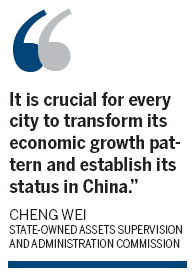Bizchina
Guangzhou beats Shanghai in Forbes rating
By Shi Jing (China Daily)
Updated: 2010-10-13 11:02
 |
Large Medium Small |
|
 |
|
A visitor walks past the booth of a backpack manufacturer at the 106th China Import and Export Fair in Guangzhou on Nov 3, 2009. Forbes said Guangzhou's top spot in its Best Cities for Business list in China was due to its dynamic economy and creativity. [Photo/Agencies]
|
HANGZHOU - Guangdong province's capital Guangzhou overtook Shanghai on Forbes China's Best Cities for Business list, the magazine said on Tuesday.

Guangzhou was second to Shanghai last year, and this year is the first time it has topped the list in its six-year history.
Forbes China Executive Chief Editor Raymond Liu said Guangzhou's top spot can largely be attributed to its dynamic economy and creativity. Although the city encountered great difficulties during the global economic recession, its GDP growth reached 11.5 percent in 2009 and 13.6 percent during the first six months of this year with a boost from the 16th Asian Games.
Forbes China surveyed 654 of the country's cities, 132 of which had GDPs of about 36 billion yuan ($5.4 billion) in 2009. The final list ranked 100 cities.
This year's results have shown the Yangtze River Delta region continues to lead in business competitiveness, as it hosts six of the top 10 cities.
The list also indicates cities in Shandong province, such as Qingdao, Yantai and Weihai, are also gaining steam. Compared to the 2009 list, nine cities rose, two maintained their positions and two fell.
The list also showed business development is lagging in many northern and western cities.
Beijing and Tianjin, and Hebei province are falling behind because of the resources wasted during their irrational competition in previous years.
|
||||
The 2010 Forbes China's Best Cities for Business list based evaluations on talent, passenger transport, freight transport, managing costs and economic vitality. This year, it added city scale, consumption capacity and creativity.
Guangzhou was able to usurp Shanghai's top spot this year because of the latter's relatively higher management costs.
Forbes China Editor-in-Chief Zhou Jiangong predicted many Chinese cities will transform their economic growth patterns in the post-recession period.
"Cities will be categorized into different levels. It is crucial for every city to transform its economic growth pattern and establish its status in China," said Cheng Wei, director of the strategic research department of the State-owned Assets Supervision and Administration Commission.



